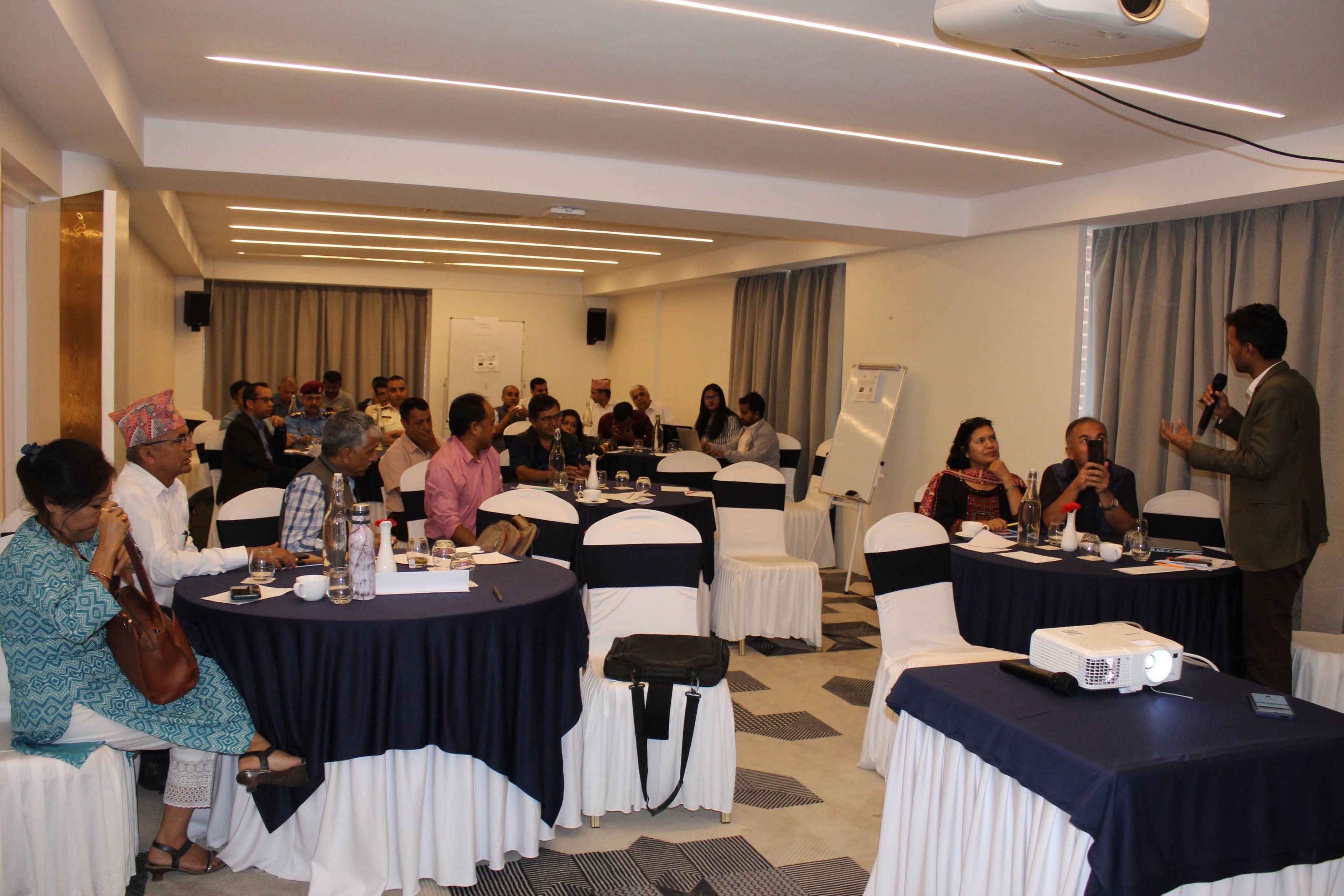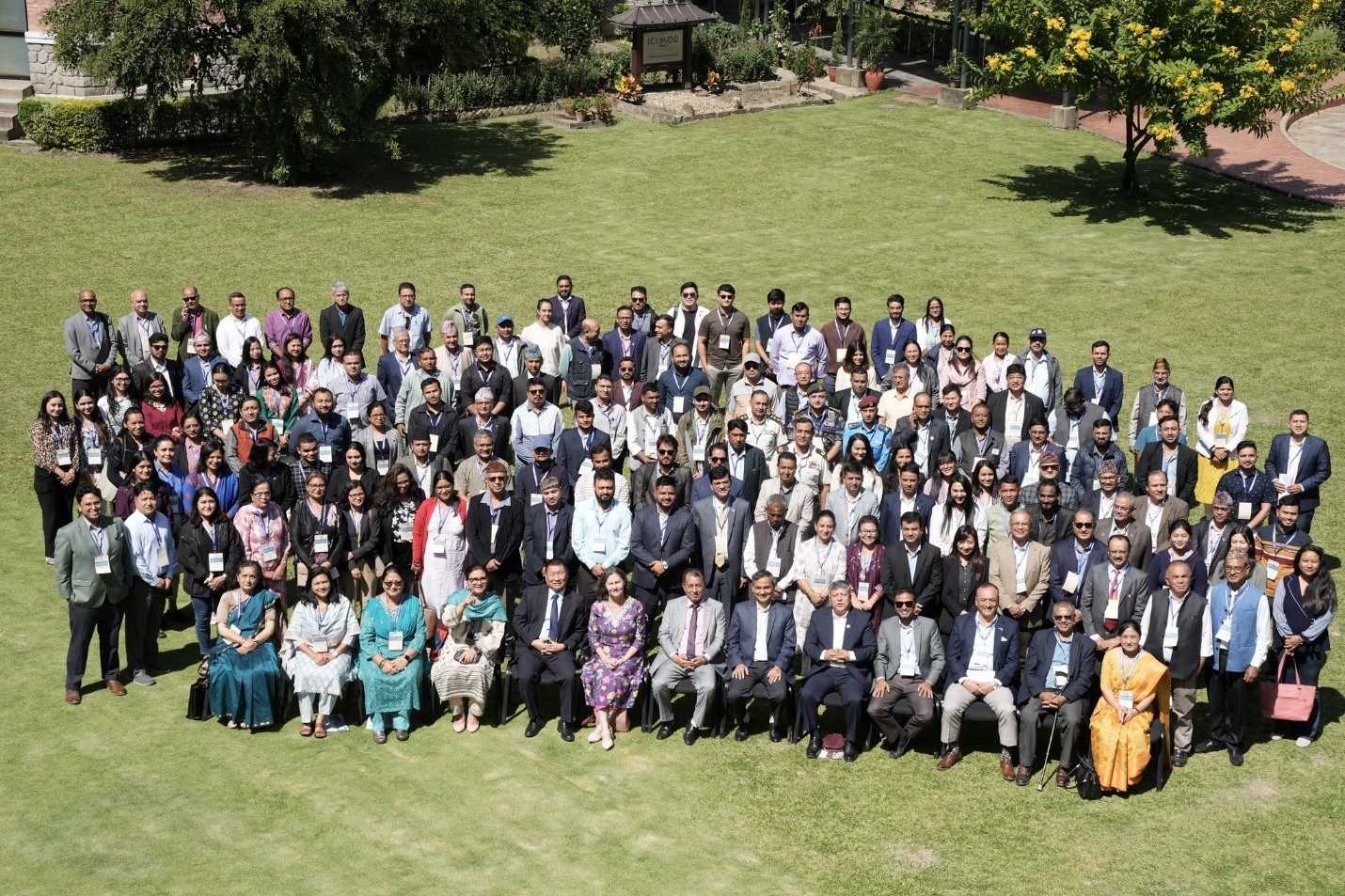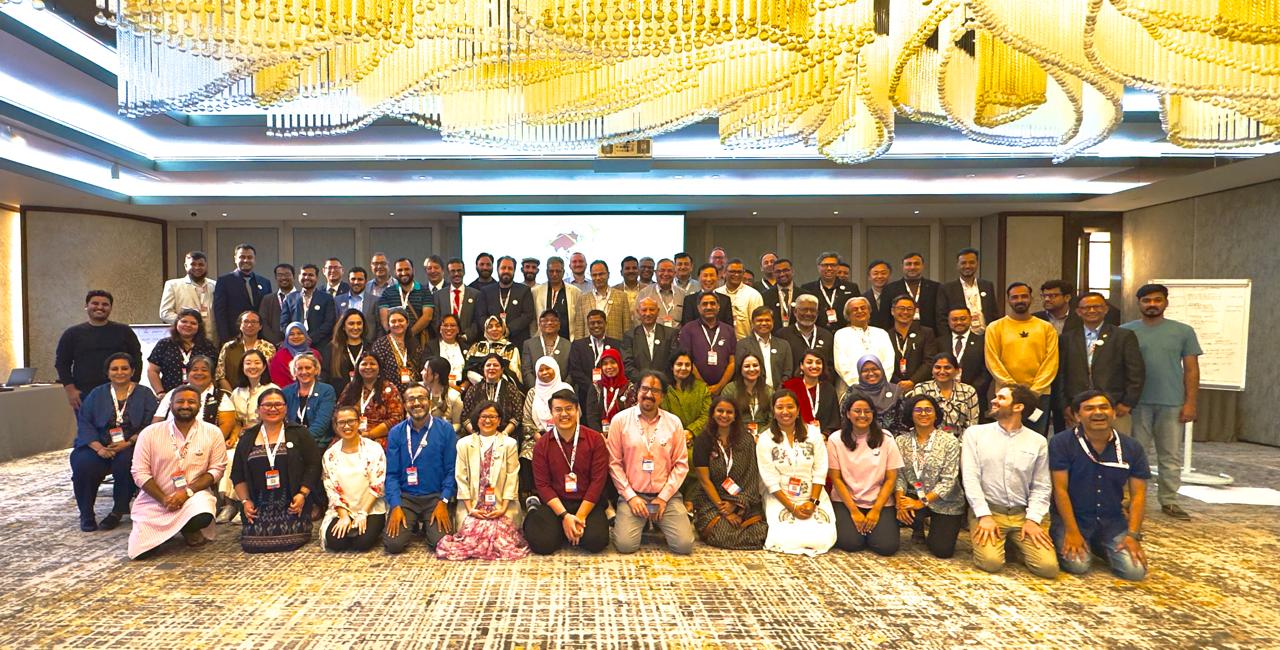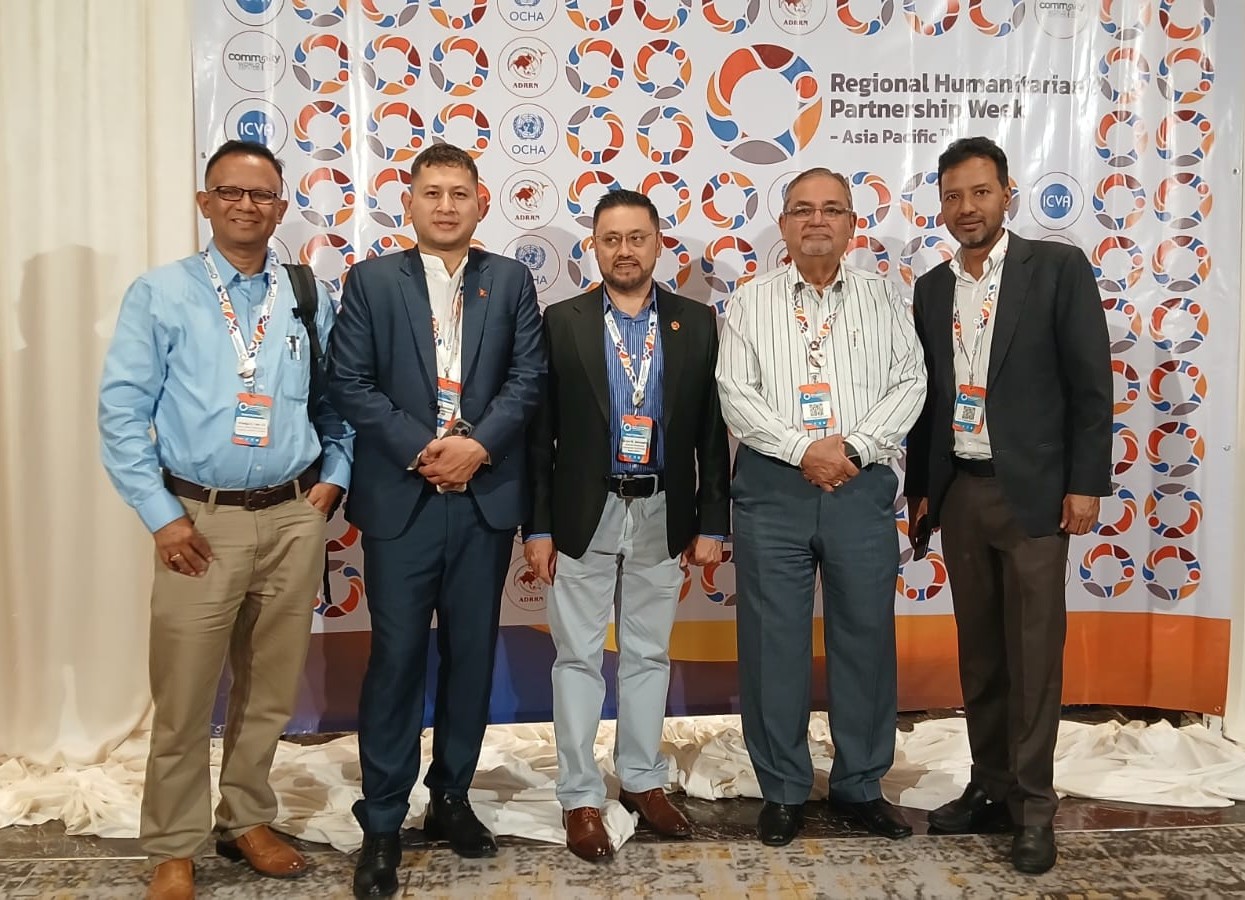National Dialogue on Disaster Management Policies

On September 15, 2023, DPNet-Nepal, with financial and technical support from USAID's Tayar Nepal, organized the National Dialogue on Disaster Management Policies. The event was initiated by Mr. Kshitiz Paudel, Program coordinator of DPNet Nepal welcoming all participants. The event, chaired by Dr. Raju Thapa, Acting Chairperson of DPNet, was attended by representatives from government agencies including Mr. Tulsi Prasad Dahal, MoHA, Mr. Somnath Gautam, MoICS and other personalities from Nepal Police, Nepal Army, NBI, NRCS, NIA, FNCCI, Blue Diamond Society, Shikhar Insurance Co. Ltd., ADCCN, IGFF, ARSOW, FWDN, NCDM, and DiMaNN.
Dr. Raju Thapa highlighted the policy dialogues, such as those on Psychosocial Counselling, Private Sector Engagement, Market System Resilience, Risk Transfer/Financing, Multi-Level Governance, Non-Government Sector Mobilization, and their significance within the broader DRR cycle. He emphasized that the recommendations from these dialogues would be reviewed during the event and subsequently forwarded to various government tiers as policy feedback.
Ms. Chetana Loksum underscored the extensive impact of disasters, not only in terms of material losses but also the psychological toll on individuals. She pointed out Nepal's existing disaster management policies, including the Disaster Risk Reduction and Management Act of 2074 and the Disaster Risk Reduction National Strategic Plan of Action 2018 to 2030. However, Ms. Loksum expressed concerns about governance and policy implementation gaps, particularly in addressing Mental Health and Psychosocial Support during all phases of disasters. She stressed the importance of bridging these gaps, advocating for the inclusion of essential elements like Psychosocial Support Programs, Psychosocial First Aid, Stress Management, Life Skills, and Resilience Building in disaster management strategies. She also called for psychosocial education and the management of acute disaster reactions, emphasizing proactive psychosocial preparedness activities. Furthermore, Ms. Loksum highlighted the necessity of introducing psychosocial first aid and support for security forces engaged in rescue operations.
Mr. Nirmal Adhikari highlighted on the current state of the insurance industry in Nepal, emphasizing its shortcomings and challenges. He noted that approximately 44.5% of the total population is involved in insurance and stressed the need for Risk Sensitive Premium Fixation to expand insurance coverage to a larger population. Mr. Adhikari shared insights on disaster management and insurance, expressing concerns about the yet-to-be-prepared National Insurance Act. To enhance disaster resilience, he recommended active utilization of local, provincial, and district-level disaster funds in insurance efforts. Mr. Adhikari emphasized the pivotal role of insurance in managing production, employment, and business stability during and after disasters. He introduced the concept of the Sovereign Liabilities First Loss Risk Layering Approach as a means to enhance disaster insurance effectiveness. Additionally, he highlighted the importance of incorporating insurance into pre-disaster preparations to bolster DRR and advocated for the inclusion of health insurance within the National Insurance Act, emphasizing the comprehensive nature of disaster risk reduction strategies.
Dr. Shiba Subedi underscored a significant policy gap, particularly regarding the allocation of responsibility for the Earthquake Early Warning System. Given Nepal's vulnerability to natural disasters, including floods and earthquakes, extending early warning capabilities to include landslides and earthquakes becomes crucial. Dr. Subedi stressed the importance of promptly alerting vulnerable areas based on the distinctive characteristics of primary and secondary waves, which is particularly vital in Nepal. Globally, some regions have issued earthquake warnings as early as 12 seconds in advance, offering valuable time for preventive measures such as halting railway operations. It is essential to differentiate between prediction and early warning, a distinction that is often misconstrued in several countries, Nepal included. Earthquakes can occur at varying depths, making monitoring more challenging compared to the relatively straightforward monitoring of floods and landslides. He further explained that establishing an earthquake early-warning system in Nepal, focusing on the middle or lesser Himalaya region, holds significant potential and importance.
Mr. Dinanath Bhandari highlighted the significance of the Constitutional and Legal Framework in disaster management. He focused on two crucial aspects: Schedule-7, outlining the List of Concurrent Powers of the Federation and the State, and Schedule-8, detailing the List of Local-Level Powers. He pointed out that these schedules create ambiguity in disaster management, particularly in determining whether it falls under the power of local authorities or constitutes a concurrent power shared among all three tiers of government. Mr. Bhandari argued that it is imperative to grant local-level authorities the autonomy to exercise disaster management powers according to their capacity. He emphasized that the domain of health-related disaster management should be entrusted to health professionals and organizations due to their specialized expertise. Additionally, he stressed that water-induced disasters and forest fires should also be managed by organizations with specific proficiency in these areas.
Mr. Bamshi Kumar Acharya provided a comprehensive overview of the key issues discussed during various thematic policy dialogues. Concerning Psychosocial Counselling, he stressed the importance of elevating its status within the legal framework and recognizing it as a priority area, as highlighted by INSARAG. Moving on to the Early Warning System, Mr. Acharya pointed out its high priority status within the legal framework of all three tiers of government, citing the Nepal Sarkar (Karya Bibhajan) Niyamawali, 2069, which assigns roles and responsibilities related to EWS to the Ministry of Energy, Water Resource, and Irrigation, leading to policy complexities.
Mr. Acharya delved into the involvement of the Private Sector in disaster management, mentioning the participation of FNCCI as a standing invitee in the National Disaster Response Framework (NDRF) 2071. However, he highlighted that the private sector's engagement still leans towards supporting rather than taking a proactive role. He emphasized the necessity of multilevel collaboration across the three tiers of government and the need to evaluate and amend existing provisions to align them with desired outcomes. Ensuring the integrity of critical infrastructures during and after disasters was another crucial point, despite the existing representation in the Disaster Management Coordination structure. Mr. Acharya noted the discrepancy between the clarity of laws and their implementation and touched upon the issue of market resilience, emphasizing the need to strike a balance between government control and provisioning to ensure market stability during and after disasters. In discussing risk transfer, he called for increased awareness and education regarding insurance and proposed incorporating disaster risk financing and transfer perspectives into all phases of disaster management, drawing insights from the experience of insuring households in the Karnali province. Turning to non-governmental stakeholders, Mr. Acharya questioned the delay in implementing roles assigned to the non-government sector, citing examples such as NPDRR, and proposed the establishment of PPDRR at the provincial level and LPDRR at the local level to engage non-government stakeholders effectively in DRR. Summing up, he highlighted the key issues, including the lack of provisional differences, and outlined the way forward, emphasizing the need for policy formulation, clarifying roles and accountability, and fostering a culture of collaborative work.
During the open floor discussion, Mr. Bishnu Timilsena raised concerns about residential settlement safety in Bara, where recent incidents, including two students falling into a dung pit, raised alarm. He revealed that a survey conducted in Kathmandu's Sundhara region indicated that 62 out of 100 buildings were non-compliant with the National Building Code (NBC) and Municipal Norms. He emphasized the need for proper urban management, resilient infrastructure, and stricter enforcement of construction standards, noting the lack of advocacy and responsible institutions in ensuring quake-resistant housing.
Mr. Rupendra Basnet stressed the necessity of microfinance solutions to support individual housing, especially in disaster-prone areas.
Mr. Dinesh Gurung highlighted the lack of clear coordination among local, provincial, and federal governments within Nepal's federal structure. He stressed the importance of clear operational and policy-level actions and advocated for the utilization of traditional and cultural institutions such as guthi and other ethnic communities in DRR.
Ms. Rama Dhakal advocated for the active participation of people with disabilities (PWDs) and other vulnerable groups at all levels of government. She emphasized the need for early warning systems tailored to PWDs, risk transfer mechanisms for them, and the challenges faced by PWDs, including the loss and unavailability of assistive devices during disasters.
Mr. Vinod Kumar Barai emphasized that during the seven-step planning process in local government, the federal government should send directives to allocate 15-20% of the budget in DRR. He also raised concerns about the weak collaboration and coordination between DEOC and LEOC, despite their stronger relationship with NEOC.
Mr. Santosh Neupane discussed how migration, driven by fears of earthquakes and the COVID-19 pandemic, has affected communities. He emphasized the need for better clarity and coordination among disaster response frameworks such as LDRP, DPRP, and Resilient Frameworks. He highlighted the importance of cash transfer mechanisms as a new approach in DRM and asked for enhancing the Rapid Accessing Market (RAM) tool by NRCS as a model to be considered by the private sector.
Mr. Bhakta Hamal emphasized the need for easier provisions for the private sector to allocate funds for DRR.
Mr. Krishna Chandra Neupane stressed the importance of sensitizing parliament members to DRM issues to ensure the passage of relevant legislation. He praised DPNet for the qualitative commitment paper and findings and suggested the preparation of checklists and their distribution to all levels of government for effective DRM implementation.
Ms. Krishna Karkee mentioned the focus on gender and intersexuality in each discussion but highlighted the need to prioritize positive discrimination as a separate matter for discussion. She emphasized that accountability of individuals, concerned stakeholders, and the government is the most critical current issue in DRM.
Mr. Tulsi Prasad Dahal, MoHA, underscored the significance of utilizing these recommendations as valuable policy feedback. He highlighted the need to align the powers of the federal, provincial, and local levels with their respective responsibilities, particularly emphasizing the high level of responsibility at the local level, as they are often the first responders in disaster situations. Mr. Dahal stressed the importance of creating an enabling environment to empower local and district authorities and suggested addressing the critical issue of a lack of technical human-power. Regarding Psychosocial counseling, Mr. Dahal called for centralizing the discussion on their role in disaster risk management, emphasizing that while everyone recognizes its importance, it has not received the priority it deserves. He emphasized that people's understanding of mental health is very misleading. He also pointed out the long-standing effort spent, around 10-12 years, in formulating EWS, comparing it to the UN's vision of early warning for all, and highlighted the ongoing challenge of lacking a Multi-Hazard Early Warning System. Mr. Dahal acknowledged the importance of policy audits and systematic situation tracking, emphasizing their increasing significance in disaster management. He emphasized the need for sharing indigenous learning and knowledge on both national and international levels. Regarding the role of District Coordination Committees, Mr. Dahal advocated for a well-defined role, particularly in disaster-related matters. He pointed out the evolving perception of cash support as a form of anticipatory action but raised the question of how to focus on other aspects of anticipatory action. He stressed the importance of establishing a robust forecasting mechanism, citing an example from the last local election when a cyclone was forecasted, but it changed its course and did not impact the election, illustrating the need for more accurate forecasting.
Dr. Raju Thapa provided a concise summary of the key aspects highlighted during the event, including the importance of strengthening psychosocial support and mental health services across all disaster phases. He emphasized improvements needed in the insurance industry and risk transfer mechanisms, as well as the need to bolster early warning systems for various natural disasters. Dr. Thapa also stressed the significance of clarifying the legal framework and powers allocated to different government levels, actively involving the private sector, engaging non-governmental stakeholders, enforcing resilient infrastructure standards, promoting inclusivity for vulnerable groups, allocating a substantial budget for disaster risk reduction, conducting policy audits, enhancing forecasting mechanisms, and sharing indigenous disaster management knowledge. He concluded by assuring that the recommendations would be presented to the relevant authorities and expressed gratitude to all participants and stakeholders, bringing the program to a close.











